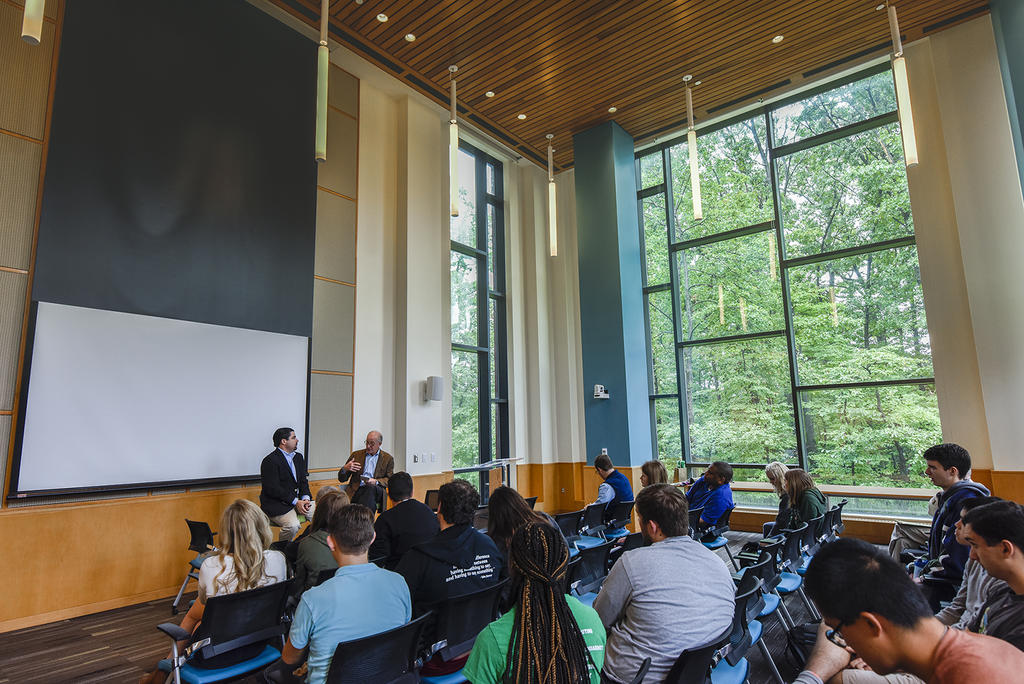Engage with Mason's Most Motivated Students
The Honors College’s top priority is positioning our students for success. Connect with outstanding and dedicated undergraduates, and help shape tomorrow’s leaders. When you partner with us, students engage in research and provide fresh insights into challenges faced by you or your clients.
The Honors College has partnered with numerous corporations, companies, and government partners in the region. When addressing a challenge, our students apply training to listen actively to their teammates’ and clients’ concerns, to think critically and creatively, and to consider solutions from multiple perspectives that draw on multiple academic disciplines. We are looking for opportunities for our students to work in teams to address strategic challenges faced by industry partners, and welcome your short and long-term engagement.
What is Honors College Consults?
Honors College Consults is a signature 3-credit course offered each Fall and Spring at the 300-level, and meets our students’ Multidisciplinary Challenges requirement. In this class, students work in multidisciplinary teams to design a solution to a challenge offered by a corporate or governmental partner from the DMV community. Students are supported in this project by a faculty instructor and mentors from the participating partner. Work on the project culminates with the public presentation of the team’s proposed solution, as well as a final report to be delivered to the participating business or governmental partner. Recent, repeat partners include Northrop Grumman, QinetiQ, and the Bureau of Diplomatic Security.
With whom do we partner?
We are interested in corporate partners from diverse industries. We form 5 partnerships for each Fall and Spring semester.
What are the selection criteria for partners?
Scope. The challenge you pose is a strategic question, as opposed to a request for some task to be completed. The student team will be taking on a consultative role by conducting practical research to deliver insights and suggestions for you to consider.
Timing. Your timeline for addressing the challenge aligns with our semester schedule, meaning you are able to wait until after the end of the semester to consider the insights and suggestions generated by the student teams and integrate them, as you wish, into your thinking or future operations.
Staff readiness. You have two staff members who will be readily available to correspond with the student team throughout the semester by video teleconferencing and email. There is an optional opportunity to meet with students in-person at the initial meeting and final presentation. Twice a year, we host an Honors College Exhibition featuring student teams’ posters at Mason’s Fairfax campus. We encourage industry partners to attend this event.
Knowledge transfer. The amount of knowledge you need to share to make the challenge manageable for the students isn't burdensome for your staff. Since the students are undergraduates coming from a variety of disciplinary backgrounds, they will not be experts in any particular body of knowledge.
What do we require from a partner?
Challenge statement. At the time your organization decides to partner with our class, we just need a sentence or two general description of the challenge you plan to pose to the student group. At least a week before the semester begins, we will need a half page (or more) that describes the challenge in more depth, including some specifications that provide clarity and guidance for the student team. If you partner with us in Fall, the semester runs from about the last week of August – first week of December. If you partner with us in Spring, the semester runs the last week of January – first week of May.
Two associates to act as mentors. We ask that two associates from your organization act as points of contact for a student team throughout the semester. We ask that you reply to any email correspondence from the student team within 2 business days. Finally, there are four required one-hour meetings: an initial meeting, 33% progress report meeting, 66% progress report meeting, and final presentation. Meetings are about one month apart.
What are some past example project challenges?
We welcome a wide variety of project challenges, so long as there is a strategic element to them.
Examples:
- Internal Facing Challenge: How might our company take advantage of voice-based interactivity in our operations? Our corporation would like to assess and improve the employee experience at the workplace through the use of voice-based interaction that require minimal to no interaction with keyboards, buttons, or other common surfaces. We want to understand where we can intelligently expand the usage of voice-enabled technology within the company.
- Client Facing Challenge: How might our organization compare the value of paid and unpaid voter datasets? We are interested to have the student team study and apply the concept of a dimensional data valuation model to compare paid and unpaid voter datasets provided by multiple States. We will examine dimensions such as breadth of data provided, quality of metadata, use, cost, or other dimensions such as restrictions and enforcements. The research also aims at understanding the intersection between the Federal and State privacy rules/regulations and the available voter personally identifiable data.
Interested? Please get in touch with us!
Reach out to our Experiential Learning Coordinator, who works to organize and select our industry, corporate, and governmental partners for the Honors College Consults course.

